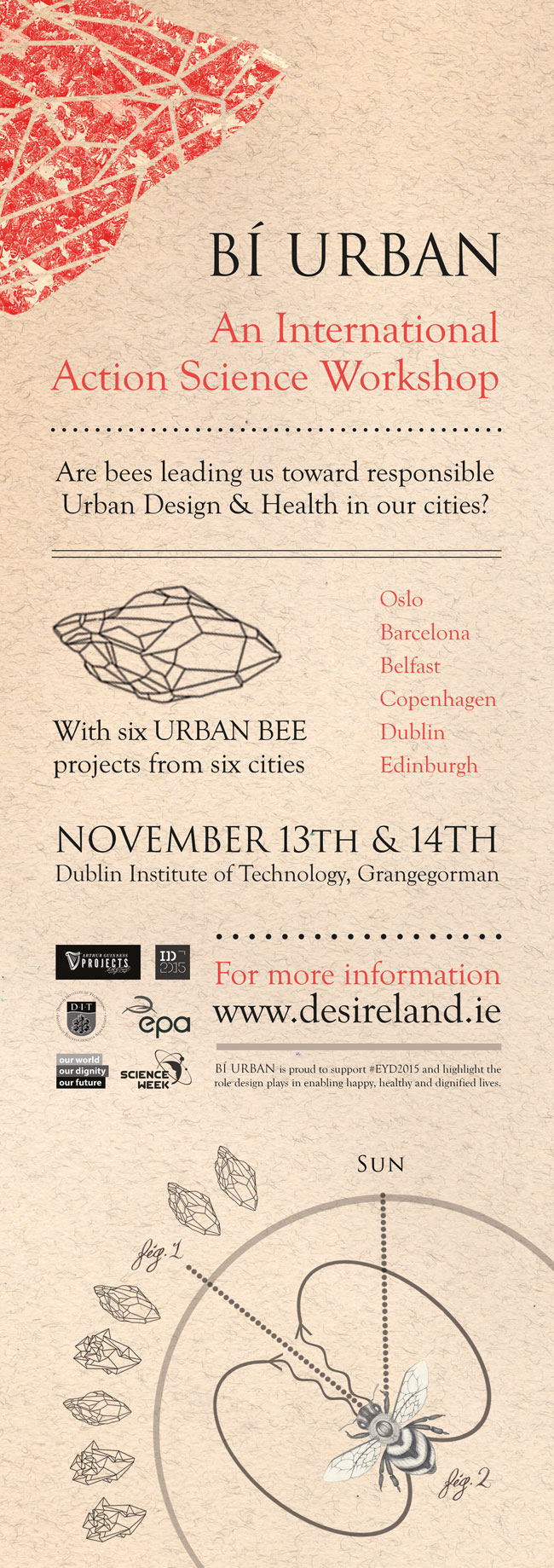BÍ URBAN 2015
Bí URBAN 2015 was s a unique two day process of participatory research that partnered six urban beekeeping projects with representatives from social projects, academics, professionals and citizens resident in Dublin’s Northwest Inner City, to create a hyperactive learning environment and foster trans-disciplinary exchange. Participants used the principals of the bee colony as a starting point to explore six urban themes: Home – Food – Health – The Commons – Navigation – Communication
Aims of the Workshop
- Repurpose Dublin’s Northwest Inner City as a learning environment
- Engage participants in two days action research and appreciative enquiry
- Document the process using a range of media for immediate and future reflection and analysis
- Create a new urban field of research, a local, national and international network of collaborators and projects to pursue in 2016
Project Description
Large parts of Dublin’s long-neglected North West Inner City (NWIC) are derelict with stretches of disused land alongside rail and canal routes, ex-industrial plots and inaccessible brownfield sites. At first sight they look like urban wastelands, pure and simple. But do they represent an opportunity?
The Lifeline
The Lifeline is a large-scale project-focused network established in 2008 to stimulate the development of a new city quarter devoted to urban ecology, sustainable design & planning, and enhanced levels of health & well-being in Dublin’s northwest inner city.
In 2015, desireland hosted a once-off action science event at DIT Grangegorman. Bí Urban engaged honeybee colony proccesses as inspiration to explore the broad range of concepts and ideas encapsulated in the Lifeline: urban agriculture, biodiversity, food science, industrial ecology, preventative health strategies, community cohesion and wellbeing. We will do so by engaging leading researchers in these fields from around the world, but also by using innovative action research methods, to encourage participatory learning,
The Bí Urban 2015 workshop built on 5 years of Lifeline research and reflection in collaboration with DIT Students Learning with Communities Programme. Data collected in 2015 during the process of our first micro-project, Bí, provided the context for a ‘space where workshop participants could safely disengage and learn to navigate and open up new ways of thinking, feeling, and acting.’ (Victor Fieldman, workshop design). The workshop explored ways in which a long-term strategy, action research, and citizen science can be used to reconceptualise the urban environment and drive behavioural change.
Benefits and output:
Bí Urban promoted the aims of desireland’s Lifeline project to a local and international audience:
- Strengthening local, national and international networking and resource sharing.
- Developing distributed mapping strategies.
- Providing a case study to support the development of Citizen Science methodology and application.
The workshop consolidated and expanded on the community-based research conducted by the Lifeline over the past five years. It functioned as an exemplar of action science in Ireland and lay foundations for the collaborative development of the next phase of our project, Bí URBAN, a studio for social creativity.
BÍ URBAN Process Designers
Participating Urban Bee Projects
ByBi Oslo & Pollinatorpassasjen Bumble Bee Highway
Bee Creative partnership initiative – Belfast
Bí URBAN was proud to support #EYD2015 and highlight the role design plays in enabling happy, healthy and dignified lives. The workshop was generously Sponsored by Guinness Projects, Irish Design 2015, The Environmental Protection Agency, Dublin City Council and Dublin Institute of Technology
 Desireland
Desireland

